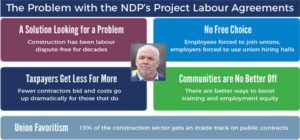VANCOUVER – The B.C. Government’s sweetheart deal with B.C.’s Building Trades Union cuts out 85 per cent of B.C.’s construction workforce, will cost taxpayers millions of dollars, and undermines opportunities for youth, women and Indigenous workers entering the industry, says a coalition of British Columbia’s largest construction associations and progressive unions.
 The newly-formed coalition, representing an industry-wide alignment of companies and workers making up 85 per cent of the construction workforce in B.C., spoke out today as the government and the exclusive Building Trades Union hold a convention in Vancouver celebrating the introduction of preferential Project Labour Agreements (PLAs) to B.C. These agreements contravene the rights and freedoms of the majority of B.C.’s construction workforce.
The newly-formed coalition, representing an industry-wide alignment of companies and workers making up 85 per cent of the construction workforce in B.C., spoke out today as the government and the exclusive Building Trades Union hold a convention in Vancouver celebrating the introduction of preferential Project Labour Agreements (PLAs) to B.C. These agreements contravene the rights and freedoms of the majority of B.C.’s construction workforce.
Under the government’s PLA, workers on the Pattullo Bridge replacement and Highway 1 (Interior) expansion project will be forced to join the government-approved Building Trades Union, operate out of a hiring hall, and be subject to the exclusive rules of the Building Trades Union.
These outcomes result in a new government policy that is openly discriminatory against non-Building Trades Union members and exploitative of B.C. workers and taxpayers. Coalition members believe that B.C. will pay a steep price for this wrongheaded change in how the government delivers infrastructure projects.
“VRCA is a champion of fair, open and transparent procurement practices,” said Vancouver Regional Construction Association president Fiona Famulak. “The PLA is an affront to these principles – not only was it negotiated without full industry consultation, it is prescriptive, and there’s a concerning lack of clarity surrounding its operational roll-out that will force both our open-shop and unionized member companies to bid without a complete understanding of project risk. This will drive up the cost of construction that will ultimately be funded by B.C.’s taxpayers. Simply put, this PLA does not serve our member companies, their skilled tradespeople, or B.C.’s taxpayers.”
“BCCA supports all construction employers and workers, regardless of labour affiliation. When we speak on an issue, we do it based on facts and for the good of the industry,” said B.C. Construction Association president Chris Atchison. “When government makes ideological decisions, B.C. loses. The PLA is a partisan policy that contravenes worker’s rights to freedom of assembly, adds bureaucracy to projects, increases risk, and creates obstacles to workforce development.”
Government and the Building Trades Union’s claims that these PLAs will spark more opportunities for apprenticeship training, and bring more women, Indigenous and young people into the workforce, are demonstrably false.
“The only thing guaranteed about the NDP’s new PLA is the monopoly the Building Trades Union will gain by signing it,” said CLAC provincial director Kevin Kohut, a union which represents thousands of B.C. construction workers. “The lack of stated goals focused on women, Indigenous people and local hires – including any means to measure success – is proof of that. It is absurd to believe that signing a deal that limits participation to 15 per cent of the workforce will result in greater inclusion.”
“You don’t train more women, young workers or people from Indigenous communities by cutting backroom deals and forcing workers to join a government-approved Building Trades Union,” said Ken Baerg, executive director of Canada Works, which represents progressive construction unions. “In a market where the major issue facing construction companies is the shortage of workers, you hire more people and train more people by being inclusive and by investing in more training spaces. The politics of giving workers jobs based on union affiliation is a failed model from generations past that will not work in our new economy where workers want choice and flexibility.”
The four construction associations and two unions, representing 85% of BC’s construction workforce, have joined with the B.C. Chamber of Commerce, the Canadian Federation of Independent Business and several construction companies and professionals to launch a court action to halt the Project Labour Agreements.
“The NDP’s current infrastructure framework is a complete fiasco,” said Paul de Jong, president of the Progressive Contractors Association of Canada. “It is unconstitutional in that it tramples on workers’ basic right to freedom of association, and it needlessly wastes public tax dollars. It’s time the B.C. government scrapped this cynical backroom deal and came up with a model that benefits all British Columbians.”
“It’s simply not fair for John Horgan to discriminate against the 85 percent of construction workers who are not part of the old-fashioned building trades hiring hall model where unions control who works,” said Chris Gardner, president of the Independent Contractors and Businesses Association. “Construction workers in B.C. deserve better from the NDP government – they deserve choice, fairness and a level playing field. Competition is the best way to keep costs down and reassures the public that government is being fair and transparent, and not just rewarding friends and insiders.”




